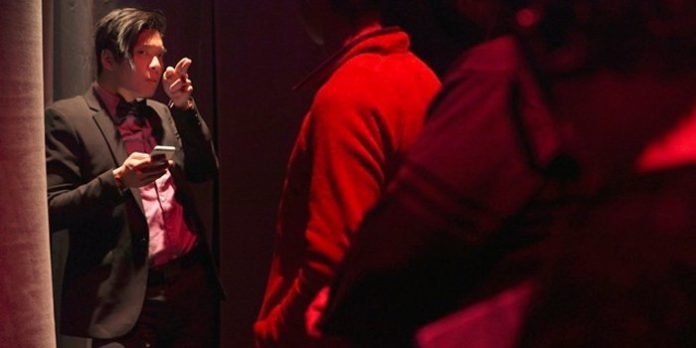I must admit to being just a tiny bit wary as I sat down to do some research on Foreign Radical, the latest show from the aptly named Theatre Conspiracy.
As I Googled some of the elements that are presented in the play, including the U.S. government’s “Watchlisting Guidance” that is at the center of the piece, I had this odd feeling that some NSA operative in the heart of Mormon country had just flagged my searches. Then the real paranoia kicked-in as I began to wonder how trouble-free my next border crossing into the USA just might be.
But wait. When it comes to government conspiracies aren’t coincidences an oxymoron? But I digress …
Such is the impact of this immersive and thought-provoking piece, long after it finishes, that seeks to explore the grey areas between privacy and surveillance, security and police state. That it is taking place at the same time Canadians are debating Bill C-51, the ominous sounding “Security of Canada Information Sharing Act and the Secure Air Travel Act”, adds a sense of coincidental urgency.
On its website, Theatre Conspiracy refers to Foreign Radical as a game, but it isn’t so much a game played against each other, but rather one played inside our own heads as we are asked a series of questions, both seemingly innocuous (“who has a Nexus card”) and hugely personal (“who has viewed pornography online in the last 24 hours”). Depending on how we answer, it changes the outcome of that particular game.
Our host for the evening, an energetic and likable Milton Lim, asks the questions as if in the lightning round of a television game show, constantly urging us to answer quickly, as he thrusts his pelvis forward in a visual emphasis to “go with our gut”.
Like an Orwellian version of the Harry Potter sorting hat, those questions help determine which “room” you end up in next. Through the 70 minute show, the small audience is split apart and reassembled a number of times depending on individual answers.
But therein lies part of the show’s problem, for the questions come so fast and furious that it is virtually impossible to make any connections. While it may only be designed to emphasise the arbitrary nature by which someone might be added to the U.S. government’s travel watch-list, it would be a more satisfying experience to have been able to make some of the connections between our answers and what we saw next.
As an example, during one sorting game three of us were separated from the rest of the audience, and while what we saw was powerful it was, and still is, impossible to determine why we saw what we did based on how we answered the questions. This concept is repeated numerous times, and even as our host presents different questions in different games, it becomes somewhat repetitive.
Another problem arises when we are separated into one of the four rooms and never provided enough time or clues to consider what other members of the audience might be seeing in a different room. For a show about conspiracies and paranoia, the action happens so quickly we are never given an opportunity to feel like we’re missing out on something important, or perhaps being played against each other. There are a couple of moments when we see the other members of the audience secretly being videotaped, and while it may make its point about surveillance, with the ubiquity of CCTV in modern life, it doesn’t go quite far enough to have an impact.
No doubt the answers to certain questions may have been revelations to those that came to the show together as they saw how their friends, partners or spouses respond to certain questions, but again there is little time for consideration. Even as a small representation of society there is little time to aggregate responses, robbing us of an opportunity to reflect on a current collective conscience when it comes to some of the show’s bigger themes.
This is an ambitious project, given the potential for multiple outcomes depending on how an audience might answer its series of questions. Its technical aspects, a mix of live action (Lim and Aryo Khakpour), video (Cande Andrade) and anxiety-inducing sound (David Mesiha), are as grand as some of the conspiracy theories out there. Stage managers rarely get their due, but it doesn’t take much to see how daunting a task it must be for Florence Barrett with a show like this.
Ultimately though, as you travel down Foreign Radical’s divergent paths, there is a growing sense of cynicism that develops. How much of what we are seeing and being told is real, and how much of it is fiction? One supposes that is at least part of what this show tries to examine, but then I’ve never been one to buy into conspiracy theories; 9/11 was not an inside job, the moon landing was real, and airplane contrails are not seeding our atmosphere.
Hindsight is 20/20, and while there may be some problems with Foreign Radical as it plays out, I admit to having spent more time researching, thinking and talking about this particular review than any other in recent memory. That it lingers in one’s mind makes it powerful.
Foreign Radical by Tim Carlson. Directed by Jeremy Waller. A Theatre Conspiracy production. On stage at The Cultch’s Culture Lab through April 25. Visit https://conspiracy.ca for tickets and information.

